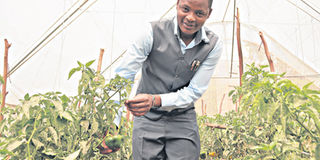The loan that made me a thriving farmer

Peter Kanyi in his greenhouse in Kikuyu, Kiambu, where he grows capsicum.
ANN MACHARIA
What you need to know:
- But it was not easy when he started. Kanyi lost his crops to powdery mildew that swept through his greenhouse destroying the capsicums.
- It all started when Kanyi, a landscape architect, saw an advert in a newspaper inviting young people to apply for loans from the YEDF. He tried his luck.
- “In the open air market, you find traders buying a product at Sh20 per kilo and re-selling it elsewhere at Sh120. The trick is to navigate through this web of traders and middlemen to get the end of the market chain. This is why I have a full-time marketer.”
When Peter Kanyi took a loan in 2012 from the Youth Enterprise Development Fund (YEDF) to start a farming project, he wasn’t exactly sure how the venture would turn out.
Two years later, the success of the agribusiness project was recently on display at the Nairobi International Trade Fair.
Displaying the succulent capsicums was Rosemary Wangare, a marketer with Foliage Masters, the trade name for Kanyi’s agricultural products. She was showcasing one of the few successful farming projects funded by the YEDF.
The story behind the capsicums on display at the fair lay elsewhere in Nderi Village, Kiambu. On the leased three-and-a-half-acres, crops thrive, turning in an average profit of Sh20,000 a week.
It all started when Kanyi, a landscape architect, saw an advert in a newspaper inviting young people to apply for loans from the YEDF. He tried his luck.
“I was surprised when the officers from the fund came to assess my land, as well as my project proposal, and concluded that I qualified for Sh300,000 loan, which was to be paid directly to the company that was to put up two greenhouses, complete with an irrigation system,” says the Jomo Kenyatta University of Agriculture and Technology graduate.
In the two greenhouses, he planted capsicums, which produce an average of 100kg per week. He sells his crop to hotels, supermarkets and companies such as Fruit Juice.
But it was not easy when he started. Kanyi lost his crops to powdery mildew that swept through his greenhouse destroying the capsicums.
“I was lucky that I had diversified. The losses put me down, but I was able to pick up through sales from other crops.”
With the returns from the greenhouses, he is comfortably able to cover his overheads, service his loan at Sh10,000 a month and keep a tidy balance.
“The biggest challenge in farming is market and knowing what is selling at what price at any given time. I’m constantly doing research and avoiding traditional outlets like open-air markets where farmers are at the mercy of traders.”
He points out that farming is capital-intensive and for him to make profit, he only goes for crops that will fetch over Sh100 per kilo. This is not likely to happen if one is dependent on the traditional markets.
“In the open air market, you find traders buying a product at Sh20 per kilo and re-selling it elsewhere at Sh120. The trick is to navigate through this web of traders and middlemen to get the end of the market chain. This is why I have a full-time marketer.”
He acknowledges that there are always many variables that often come into play, and which can easily shatter a farmer’s dream. These include new diseases and market glut.
To cushion himself against this, Kanyi does not rely on one crop. He also grows carrots, cabbages, sukuma wiki (collard green) and strawberries.
BURN YOUR FINGERS
These are staggered all-the-year around. “I make sure every month I plant a little of everything. This ensures that every week throughout the year, I am selling something and I have cash coming in every week. It also makes the farm self-sustaining.”
Eventually, he plans to extend his farming to cover all the three-and-a-half-acres. One thing he has learned is that getting to the point of optimum returns is a long and painful process.
“Always start small and expand gradually. Don’t jump in expecting quick profits and remember at one time or another, you will burn your fingers. And when this happens, you must have the resolve to pick yourself up and forge ahead. In the long run, farming is rewarding.”
The 31-year-old consultant with Landscape Architects says farming comes naturally to him because his full-time job involves plants and moving the soil around.
Kanyi encourages the youth to embrace farming, pointing out that with a rapidly growing urban population, there will always be a market for food.




